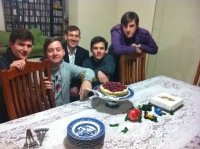A Homeschooling Journey: Illness, a Baby Girl, and a Move Towards Unschooling
On Tuesday morning my oldest son slept on and off for hours at a time. This was unusual for him. Around noon he asked me to make him a grilled cheese sandwich. Before I finished preparing it, he fell asleep once again.
That afternoon my four boys and I climbed into the minivan and drove to the medical center. My son needed a physical for summer camp and since he appeared to have the flu or maybe something worse, I scheduled an appointment for him. The pediatrician checked his vital signs and talked to him and seemed satisfied that he was healthy. I sensed that was not true. He actually needed to sit down for a couple minute break on the walk into our pediatrician's office from the car. I asked her to test his urine, because my husband and I were suspecting diabetes. She agreed it was a good idea to check. A few minutes later she came back to the room with the grim news that he did indeed have type 1 diabetes and started the procedures for admitting him into the ICU.
That was a sad, sad day. Our journey with this illness has been challenging and heart breaking at times. However, one small thing stands out in my mind after the fact: my educational philosophy throughout this crisis.
I am ashamed to admit that while my son lay ill in bed those few days before that dreadful Tuesday afternoon, I sat with him and read his "school work" to him so that all three boys would stay on schedule. No one else remembers this or finds this fact significant. But I do. It is one of those decisions I will always regret and also the decision I will always be glad led me to where I am today - on the path to becoming an unschooler.
It didn't even occur to me right away, not until the next fall. I designed the new school year's schedule with my old educational philosophy in the forefront of my mind. I bounced from one son to the next all day long, each day, until dinnertime, checking off all the items on our lists.
Then one day I thought to myself, "How am I going to keep up this crazy pace with a new baby come next January or February?" I started reading the unschooling Catholics yahoo group every morning with breakfast. I reread Suzie Andres' book "Homeschooling with Gentleness" and read for the first time her book "A little Way Of Homeschooling." The Holy Spirit inspired me to make many changes to our daily learning routine. I followed the lead of one of the ladies on the yahoo group to create a focus for each day. I bought my oldest son a fun math program to keep his interest in this area alive. I also found a gentle writing program through the recommendation of other Catholic unschoolers. Learning did become more joyful.
In January, our baby girl arrived. I believe God sent us her as a gift to help us move past my oldest son's diagnosis. Up until that time my life was overwhelmingly focused on checking blood sugars, counting carbs, giving insulin shots, testing for ketones, and wondering if I would walk into a room and find my son unconscious. Preparing for and taking care of a baby actually eased the stress of taking care of my son.
When I really knew my perspective had changed was when I began to feel uncomfortable when family and friends starting asking if we were "back to school" just weeks after giving birth. When people asked if we were going to "school" into the summertime to make up for lost time, I said "no." My second oldest wanted to spend the day reading, and I thought that sounded like a good idea. My oldest son started writing a book about his favorite computer game, and I noticed his spelling was improving. Before my enlightenment, I would have surely home schooled into June and July if we had "taken off from school." I also would not have considered a computer game a worthy educational tool.
I am still on my homeschooling/unschooling journey. It will probably take me some time to more fully embrace the ideals of unschooling. However, I hope by trusting God, I will gently guide my children to a lifestyle of loving God and loving learning - my goals from the beginning.











